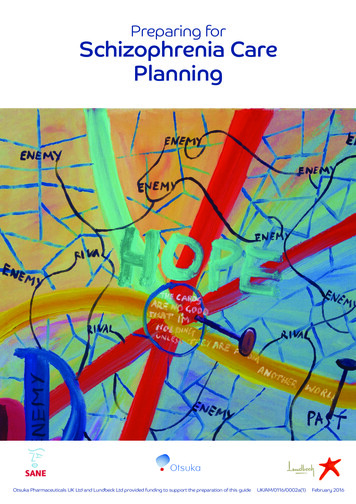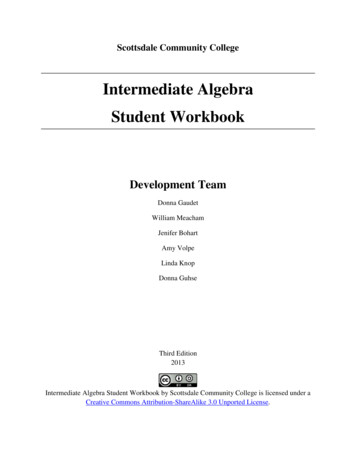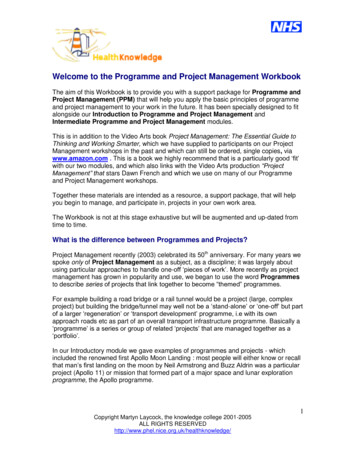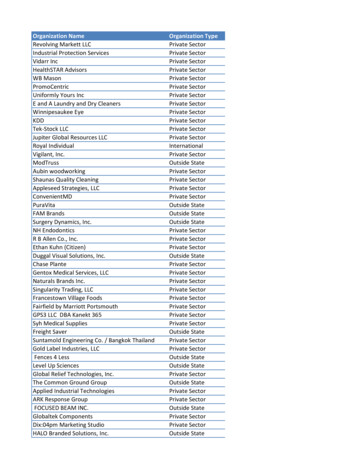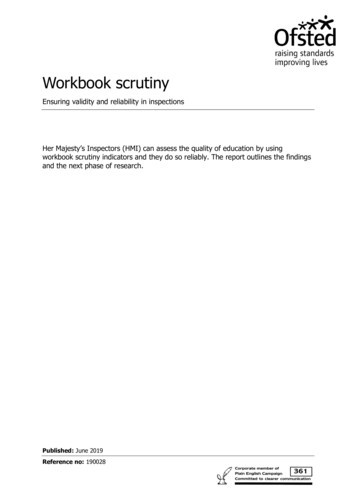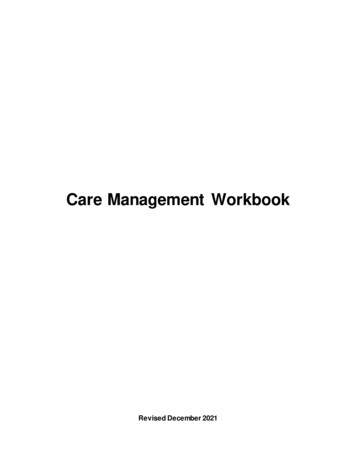
Transcription
Care Management WorkbookRevised December 2021
Table of ContentsCare Management Process Tools:1. Care Management Definition2. Case Management Definition3. Care Management Conceptual Framework4. Outreach Overview5. CM Component Timeframes and Standards6. Initial Health Screen (IHS) Scoring Strategy and healthcondition list7. Comprehensive Needs Assessment (CNA)8. Care Plan Requirements9. Monitoring Plan2
1. Care ManagementDMAHS definitionCare Management means a set of Enrollee-centered, goal-oriented, culturally relevantand logical steps to assure that an Enrollee receives needed services in a supportive,effective, efficient, timely and cost-effective manner. Care Management emphasizesprevention, continuity of care and coordination of care, which advocates for, and linksEnrollees to, services as necessary across providers and settings. At a minimum, CareManagement functions must include, but are not limited to:1. Early identification of Enrollees who have or may have special needs;2. Assessment of an Enrollee's risk factors;3. Development of a plan of care;4. Referrals and assistance to ensure timely access to providers;5. Coordination of care actively linking the Enrollee to providers, medical services,residential, social, behavioral, and other support services where needed;6. Monitoring;7. Continuity of care; and8. Follow-up and documentation.Care Management is driven by quality-based outcomes such as: improved/maintainedfunctional status, improved/maintained clinical status, enhanced quality of life, Enrolleesatisfaction, adherence to the Care Plan, improved Enrollee safety, cost savings,and Enrollee autonomy.3
2. Case ManagementDMAHS DefinitionCase Management, a component of Care Management, is a set of activities tailored tomeet a Enrollee’s situational health-related needs. Situational health needs can bedefined as time-limited episodes of instability. Case managers will facilitate access toservices, both clinical and non-clinical, by connecting the Enrollee to resources thatsupport him/her in playing an active role in the self-direction of his/her health care needs.As in Care Management, Case Management activities also emphasize prevention,continuity of care, and coordination of care. Case Management activities are drivenby quality-based outcomes such as: improved/maintained functional status; enhancedqualityof life; increased Enrolleesatisfaction;adherenceto theCare Plan;improved Enrollee safety; and to the extent possible, increased Enrollee self-direction.4
3. Enrollee–Centered Care Management Conceptual FrameworkOverviewThe Division of Medical Assistance and Health Services’ (DMAHS) core quality missionis to develop and implement program, policies, and activities that promote positive healthoutcomes and are consistent with current medical standards. As such, DMAHS seeks toimprove the current Care Management program to better meet the needs of the targetpopulation. Care should be less fragmented and more holistic; Care Managers shouldstrive to better communicate across settings and providers; and Enrollees should havegreater involvement in their Care Management.GoalsDMAHS’ goals for the Care Management program include: Provide access to timely, appropriate, accessible, and Enrollee-centered health care; Improve the quality of care and health outcomes for Enrollees; Tailor care to the Enrollees’ needs by using evidence-based treatment, best practices,and practice-based evidence to manage services by duration, scope, and severity; Ensure health plans involve Enrollees and their family in the care process; Reduced Emergency Room visits and avoidable hospitalizations; Promote effective and ongoing health education and disease prevention activities; Provide cost-effective care; and Promote information sharing and transparency.Equally as important to an effective Care Management program is the development of aset of expectations for what is required from Care Managers (Illustration 1). Key CareManagement responsibilities relate to understanding the needs of individuals andensuring access to needed Care Management services.Illustration 1. Care Management’s GoalsCare ’Individual ClinicalNeedsAssess CommunityResources Available toEnrolleeEnsure Enrollees’Access to Services5
Overall PhilosophyThrough Care Management, Contracted health plans will identify the needs and risks ofEnrollees; identify which services Enrollees are currently receiving; identify Enrollees’unmet needs; stratify Enrollees into care levels; serve as coordinators to link Enrollees toservices; and ensure Enrollees receive the appropriate care in the appropriate setting bythe appropriate providers. As part of the Care Management process, MCOs will: Apply systems, science, and information to identify Enrollees with potential CareManagement needs and assist Enrollees in managing their health care moreeffectively with the goal of improving, maintaining, or slowing the deterioration of theirhealth status. Design and implement Care Management services that are dynamic and change asEnrollees’ needs and/or circumstances change. Use a multi-disciplinary team to manage the care of Enrollees needing CareManagement. While Care Management may be performed by one qualified healthprofessional (a nurse, social worker, physician, or other professional), the process willinvolve coordinating with different types of health services provided by multipleproviders in all care settings, including the home, clinic and hospital.Definition of Care ManagementCare Management means a set of Enrollee-centered, goal-oriented, culturally relevantand logical steps to assure that a Enrollee receives needed services in a supportive,effective, efficient, timely and cost-effective manner. Care Management emphasizesprevention, continuity of care and coordination of care, which advocates for, and linksEnrollees to, services as necessary across providers and settings. Care Managementfunctions include:1. Early identification of Enrollees who have or may have special needs;2. Assessment of a Enrollee’s risk factors;3. Development of a plan of care;4. Referrals and assistance to ensure timely access to providers;5. Coordination of care actively linking the Enrollee to providers, medical services,residential, social, behavioral, and other support services where needed;6. Monitoring;7. Continuity of care;8. Follow-up and documentation.Care Management is driven by quality-based outcomes such as: improved/maintainedfunctional status, improved/maintained clinical status, enhanced quality of life, Enrolleesatisfaction, adherence to the Care Plan, improved Enrollee safety, cost savings,and Enrollee autonomy.Components of Care Management (Illustration 2)Care Management is a comprehensive, holistic and dynamic process that encompassesthe following seven components:1. Identification of Enrollees who need Care Management;2. Comprehensive needs assessment;3. Care Plan development;4. Implementation of Care Plan;5. Analysis of the effectiveness and appropriateness of Care Plan; and6. Modification of Care Plan based on the analysis.7. Monitor Outcomes6
Illustration 2. Components of Care Management/Overall Process.1. IdentifyEnrolleesNeeding CareManagementRe-AssessEnrolleesNeeds(Ongoing)2. AssessCare Needsof Enrollee3.DevelopCare PlanEnrolleeCentered6. ModifyPlan basedon Analysis4.ImplementCare Plan5. AnalyzePlanEffectiveness7. Monitor Outcomes7
Components:1. Identification of Enrollees Who Need Care Management:Identification of Enrollees Needing Care Management: The MCOs must have effectivesystems, policies, procedures and practices in place to identify any Enrollee in need ofCare Management services. All new Enrollees (except for DCP&P and DDD Enrollees)will be screened using an approved Initial Health Screen tool (IHS) to quickly identify theirimmediate physical and/or behavioral health care needs, as well as the need for moreextensive screening. Any Enrollee identified as having potential Care Management needswill receive a detailed comprehensive needs assessment (if deemed necessary by ahealthcare professional), with ongoing Care Coordination and Management asappropriate. All elements of the State approved IHS tool that appear in this Workbookmust be included in the MCOs’ screening tool.1. Comprehensive Needs AssessmentComprehensive Needs Assessment (CNA): The MCOs will conduct an approved CNA onnew Enrollees following the evaluation (by a healthcare professional) of their Initial HealthScreen results; any Enrollee identified as having potential Care Management needs, aswell as DCP&P and DDD Enrollees. The goal of the CNA is to identify a Enrollee’s CareManagement needs in order to determine a Enrollee’s level of care and develop a CarePlan. The CNA will be conducted by a healthcare professional, either telephonically orface-to-face, depending on the Enrollee’s needs. All elements of the State approved CNAtool that appear in this Workbook must be included in the MCOs’ assessment tool.3. Plan of Care to Address Needs Identified:Care Plan: Based on the comprehensive needs assessment, the Care Manager willassign Enrollees to a care level, develop a Care Plan and facilitate and coordinate thecare of each Enrollee according to his/her needs or circumstances. (See Process Flow:Illustration 3) With input from the Enrollee and/or caregiver and PCP, the Care Managermust jointly create a Care Plan with short/long-term Care Management goals, specificactionable objectives, and measurable quality outcomes. The Care Plan should beculturally appropriate and consistent with the abilities and desires of the Enrollee and/orcaregiver. Understanding that Enrollees’ care needs and circumstances change, theCare Manager must continually evaluate the Care Plan to update and/or change it toaccurately reflect the Enrollee’s needs.4. Implementation of Care Plan:Care Plan Implementation: The Care Manager shall be responsible for executing thelinkages and monitoring the provision of needed services identified in the plan. Thisincludes making referrals, coordinating care, promoting communication, ensuringcontinuity of care, and conducting follow-up. Care Management activities may beconducted telephonically, electronically or face-to-face, depending on the Enrollee’sidentified needs. Implementation of the Enrollee’s Care Plan should enhance his/herhealth literacy while being considerate of the Enrollee’s overall capacity to learn and (tothe extent possible) assist the Enrollee to become self directed and compliant with his/herhealthcare regime.8
5. Analysis of Care Plan Effectiveness and Appropriateness:Care Plan Effectiveness: Each Enrollee with Care Management needs must have a CarePlan to address his/her individual health related needs that when successfullyimplemented, assists him/her to reach their optimal level of wellness and self direction .The MCO will develop a process that is reflected in its policies and procedures to regularlyreview the Care Plan to analyze its effectiveness in reaching the stated goals and desiredoutcomes. The Care Manager will provide feedback of the analysis to theEnrollee/caregiver, primary care physician, and other healthcare professionals involvedin the Enrollee’s care.6. Modify Care Plan Based on Analysis:Care Plan Modification: Following analysis, the Care Manager will modify the strategiesoutlined in the Care Plan to achieve its stated goals and desired outcomes. The strategiesmust reflect any new information received, the Enrollee’s current circumstances andhealthcare status, and remain consistent with the abilities, desires and level of selfdirection of the Enrollee and/or caregiver.7. Monitoring Outcomes:Monitoring of Care/Case Management Process: The effectiveness of the Care and CaseManagement process will be measured by the review and analysis of patient outcomes.The MCOs must develop policies and procedures that describe protocols detailing howthey will collect and submit population based data measures to DMAHS annually forreview. State approved measures will be used to monitor success based on predetermined scoring benchmarks.9
Illustration 3. Process Flow for IHS and CNAEnrollee Enrolled inManaged CareDoes Enrollee have aDDD or DCP&Pdesignation?If NO:Enrollee receives IHSIf YES:Enrollee automaticallyreceives CNABeneficiary enrolled inBeneficiary enrolledBased on results of CNA,Enrollee receives anindividualized Care Planand is assigned to CareManagement or CaseManagementIs the Enrollee pregnant or presentwith any referral needs?If YES:Connect Enrolleedirectly to pre-natalCase Managementand/or appropriateprogramIf NO:Proceed to nextquestionIs the Enrollee’s score5 or higher?If YES:Enrollee receives CNABased on results of CNA,Enrollee receives anindividualized Care Plan andis assigned to CareManagement or CaseManagement4. Outreach OverviewIf NO:Enrollee does not needCNA at this time, butnurse Care Managementreviews IHS to determineany Case Management orcoordination needs.If A TRIGGER EVENT OCCURS:Enrollee is re-assessed to determineneed for Care Management.Examples of Trigger events:Unplanned hospitalization; ER visits(2 or more); Exacerbation of chroniccondition and/or disability; and10mental health hospitalization
Two Levels of Outreach: Initial and Aggressive.Initial Outreach is to be utilized for all new “General Population” Enrollees inorder to complete an IHS.Purpose: To identify Enrollees that may have Care Management needs (not easilyidentified otherwise - as with PSC). Minimal Standards:o At least 2 different methods required (i.e. telephonic, writtencorrespondence, etc.).o Completed within 45 days from enrollment. Policies must be developed describing purpose, standards, definitions,timeframes and process. Policies must include a process developed to address the Enrollees notfound (i.e. returned cards, no response) after the initial outreach efforts arecompleted. The process must include:o A detailed plan of the MCO’s use of internal ‘systems’ to identify andcontact these Enrollees (i.e. utilization data, P.A. reports, pharmacydata, etc.)Aggressive Outreach is to be utilized to complete a CNA.Purpose: To complete a comprehensive needs assessment of Enrollees whohave been identified as having potential CM needs. Minimal Standards:o To include various types of methods (i.e. telephonic, writtencorrespondence, provider contact, external agency contact, homevisits, etc.).o Completed within 45 days from enrollment for DDD & DCP&P.o Completed within 30 days following an IHS score of 5 or greater, oridentification of potential Care Management needs through othersources (i.e. referrals, data alerts, utilization reports, pharmacy data,risk scores, clinical judgment etc.). Policies must be developed describing purpose, standards, definitions,timeframes and procedures. Policies must include a process developed to address the Enrollees notfound even after reasonable aggressive outreach efforts are complete. Theprocess must include:o A detailed plan of the MCO’s ongoing use of internal ‘systems’ toidentify and contact these Enrollees including systems ‘alerts’ thatwill indicate to staff that outreach is ongoing and aggressive.***All Outreach policies must also include the MCOs’ plans for how they willmonitor the success of their process, including benchmarks and self correctionmethods to improve success rates over time.11
5. CM Component Timeframes and StandardsProcess StepsTimeframe1. ID of Enrollees w/potentiala. DDD & DCP&P: At Enrollment per PSCCM needsb. General Population: By completion of IHSc. Other (Any population): Data Mining, Risk Scores,Referrals, Concurrent Review* MCO’s will have identification process policies andprocedures describing all the components used foridentification, including systems used to support properidentification, how system(s) will be used,interconnectability and information flow chart, internalflags and responsible unit/person (tools must include atminimum, risk scores, data mining, sentinel events, andtime tables to be used for identification, etc.)2. IHS Completiona. DDD & DCP&P: N/Ab. General Population: 45 days from enrollment(ABD children must have priority for completion)c. May be completed and scored using information fromdata sources.*MCO’s will have policies in place describing how theywill stratify.3. CNA Completiona. DDD & DCP&P: 45 days from enrollmentb. General Population: 30 days from identification of CareManagement needs. IHS score of 5 or greater Identification through other sources (i.e. referrals,data alerts, utilization reports, pharmacy data, riskscores, clinical judgment, etc.)4. Care Plan Developmenta. 30 days from CNA completion (all populations)5. Outreach(Timeframes and Standardslisted in document titled"Outreach Overview")a. Initial Outreach (To new general population Enrolleesin order to complete an IHS)--- Minimal Standards:1. At least 2 different methods required.2. Completed w/in 45 days from enrollment.**Individual MCO’s will develop policies describing theiroutreach procedures, standards and definitions.b. Aggressive Outreach:--- Minimal Standards:1. Must include various types of methods used (i.e.telephonic, written correspondence, provider contact,external agency contact, home visits, etc.)2. Completed within 30 days of IHS completion (forEnrollees with IHS score of 5 or more) or 45 days fromenrollment for DDD and DCP&P.**MCO’s must develop policies describing purpose,standards, definitions, timeframes and procedures.Policies must include a process developed to address theEnrollees not found even after reasonable aggressiveoutreach efforts are complete.12
6. IHS Scoring Strategy and Condition ListIHSQuestions#1#2#3#4#5CM Stratification TriggersAdmitted to the hospital in past 6 months?#7#81 admit 1 pt.2 admits 2 pts.3 admits 3 pts.0 - 1 visit 0 pts.2 - 4 visits 1 pt.5 visits 2 pts.Emergency room visit in past 6 months?Planned future hospital admissions orsurgeries?1 pt.Self-rating of health: Excellent, VeryGood, Good, Fair or Poor.Medical and mental health conditions:List of Conditions attached#6ScoringFair 1 pt.Poor 2 pts.0 conditions 0 pts.1 - 2 conditions 1pt.3 conditions 2 pts.Uses four or more prescribedmedications?1 pt.Use any medical equipment Currently?2 pts.DME Exceptions: Cane, Walker, Crutches,Nebulizer, Diabetic SuppliesNeeds help with Activities of Daily Living?(e.g., bathing, medication, feeding).2 pts.Total ScoreNext Recommended Step0-4Enrollee does not need to undergo clinical needs assessment atthis time, but may need other services.5 Conduct clinical needs assessment.13
6. IHS Scoring Strategy and Condition List1Asthma2COPD (Chronic Obstructive Pulmonary Disease)3Tuberculosis4Seizures5Memory Problems6Depression7Schizophrenia8Congestive Heart Failure9Heart Disease10Hepatitis11Diabetes12Kidney Failure13On Organ Transplant List14Paralysis15Multiple Sclerosis16HIV/AIDS17Stroke18Lead Poisoning19Sickle Cell disease20Cancer w/treatment21Hemophilia22Pregnancy14
7. COMPREHENSIVE NEEDS ASSESSMENT (General Population, Peds, ABD, and DD Caregiver)ELEMENTSQUESTIONSDEMOGRAPHICS1234567What is your name (Enrollee)?What is your primary telephone number?What is a secondary telephone number we could use?In case of an emergency, what is the name and telephone number of a person we can contact?What is the primary language spoken in the home?What is your current address?Who is providing the information to complete the assessment (include name and relationship toEnrollee)?8 Is there a guardian involved?HISTORY1 Who is your current primary care provider or family doctor? (Provide name and telephone number)What was the date of last appointment?2 Do you see any specialists? (Provide names and telephone numbers)What was the date of last appointment?3 Do you see a dentist? (Provide name and telephone number)What was the date of last appointment? Routine or emergency care?4 Which of the following medical conditions do you/have you had? (Select: Asthma, ChronicObstructive Pulmonary Disease, Tuberculosis, Seizures, Memory Problems, Depression,Schizophrenia, Congestive Heart Failure, Heart Disease, Hepatitis, Diabetes, Kidney Failure, OnOrgan Transplant List, Paralysis, Multiple Sclerosis, HIV/AIDS, Stroke, Lead Poisoning, Sickle Celldisease, Cancer w/treatment, Hemophilia, Other)5 On a scale of 1 to 5, with 1 being "poor health"; 2 being "fair health"; 3 being "good health"; 4 being"very good health"; and 5 being "excellent health", how would you rate your overall health duringthe past three months, including medical, dental and mental health?6 Which medications are you taking, including over-the-counter medications and supplements?Do you need any help tak ing your medications?Which pharmacy do you use? (Provide name)7 Do you have vision problems not corrected with lenses?If yes, explain.8 Do you have hearing problems not corrected with assistive aids?If yes, explain.9 What is your current height?10 What is your current weight?Have you lost weight in the past 6 months without trying?How much have you lost?Have you gained weight in the last 6 months without trying?How much have you gained?11 Are your immunizations up-to-date?12 Are your preventive screenings up-to-date, both medical and dental?FUNCTIONALITY1 Do you have a problem with any of these? (Select: independent as age appropriate; dependent asage appropriate; requires assistance; completely dependent)Ambulation/WalkingBathing with sponge, bath, showerOral health (brushing, flossing, chewing)DressingToilet UseTransferring (in and out of bed or chair)EatingContinence (controls bowel and bladder by self)ShoppingCook ingUsing the telephoneHousework15
23456Doing laundryDrivingManaging financesDo you have a family Enrollee or other caregiver assisting you?How often is assistance provided? (Select: daily, week ly, week ends, all of the time)Do you feel you need additional help?Do you currently use home health services?List home health services used, agency name, hours, and frequency.Do you currently use any medical equipment and/or supplies?List medical equipment and supplies used and DME company.Do you need transportation to and from medical appointments?Do you have an emergency plan? (Drop down menu to include: Do you know what to do in casethe electricity goes off? Who would you call if you need medical help? What would you do if therewas a fire in your apartment, etc?)NUTRITION1 Do you follow any special diet? If yes, please describe.2 How is your appetite?3 Do you have any feeding or eating issues? [Drop down menu to include: difficulty chewing orswallowing, dry mouth, GI disturbances (constipation, distension, diarrhea), food allergy, lactoseintolerance, GT feeds, excessive fussiness, spitting up, projectile vomiting, colic, difficulty sucking,receives special formula]4 Do you have any difficulty obtaining food or formula?5 Do you make use of WIC, food bank, food stamps, or other resources to obtain food?DEVELOPMENTAL CONCERNS (Note: DDD Enrollees must be asked these questions)1 Do you attend school/day program?If yes, what is the name of the school/day program?2 In what grade/type of day program are you currently enrolled?3 Do you receive special services/ therapies at school/day program? (IEP, occupational therapy,physical therapy, speech therapy, other)4 Have you informed the school/day program about your medical condition(s) or medications?5 Question for parent/caregiver: Is there any activity that your child can't do that other children his/herage can do?6 Question for parent/caregiver: Do you have any concerns about your child's behavior?SUPPORT/ COMMUNITY RESOURCES1 Do you participate in community support programs?What community support services do you currently have or need?2 Do you currently have a Case/Care Management through another agency or program (i.e., DDD,DCP&P, SCHS, waiver)?What is the Case/Care Management's name and contact information?3 What type of living arrangement do you have? (Select: house, apartment, assisted living, boardinghome, nursing home, other)Is current residence suitable for home care? (Only to be asked if applicable)4 Who do you live with? (Select: alone, friend, other family Enrollee, paid help, spouse or significantother, other)5 Do you have any friends or family that are willing to provide emotional support?6 Do you have any barriers to care (i.e. difficulty getting appointments, transportation, don't likedoctor)?PSYCHOSOCIAL HISTORY (Note: These questions are only to be asked of Enrollees who are 10 years old and older)1 Do you drink alcohol?On a typical day, how many drink s do you have? (open-ended)On average, how many days per week do you drink alcohol? (open-ended)2 Do you smoke or use tobacco?How much do you smoke a day? (Select: less than one pack a day, 1-2 packs a day, 2 ormore pack s a day)Do you want to quit smoking?3 Do you use recreational or street drugs?On a typical day, how much do you use?( open-ended)How many times a week do you use recreational or street drugs?4 Have you had any recent behavioral health and/or substance abuse treatment? If yes, pleasedescribe.16
5 Depression screen (PHQ-2): Over the last 2 weeks, how often have you been bothered by any ofthe following problems? (Select: not at all, several days, more than half the days, or nearly everyday)Little interest or pleasure in doing thingsFeeling down, depressed or hopeless6 Are you (or the person you are caring for) thinking of doing anything that may be harmful toyourself (themselves) or someone else?7 Do you ever feel unsafe at home?8 Is there something else you need me to know? Please provide any additional relevant information.Supplemental Questions for DD Beneficiaries (Note: Care Managements should tailor questions to either thecaregiver or Enrollee, as appropriate)1 Are you disruptive or aggressive towards yourself or others?2 Is Enrollee prevented from participating in any activities due to mental health or behavioral issues?3 Is Enrollee currently receiving mental health and/or substance abuse services?4 As the Enrollee's caregiver, describe the Enrollee's cognitive status.5 Has the Enrollee's behavior changed in the last 6 months? If so, what is the impact?6 Please describe how you care for the Enrollee (i.e., what kinds of task do you do for the Enrollee?Do you care for the Enrollee full time, etc.?)7 Do you feel that the Enrollee you care for is getting enough help?8 Is there any help that you would like?9 Do you want information about benefits/services available?10 Do you have a DDD case manager? If yes, do you know how to reach him/her?11 When was the last time you were in contact with your DDD case manager?Questions for MCO Care Manager1 Cognitive FunctionIn the Care Manager's opinion, what is the Enrollee's cognitive functioning level? (Select:alert/disoriented, easily distracted, requires considerable assistance, requires total assistance)2 Behavioral HealthWhile completing this assessment did the Enrollee sound depressed or overly anxious or didcaregiver state same?In the Care Manager's opinion, are there behavioral health issues pertaining to the Enrollee orcaregiver?3 Risk FactorsWhat are the Enrollee's risk factors? (Select: none, smoking, alcohol/drug dependency,obesity, nutritional, special needs, other)In the Care Manager's opinion, does the Enrollee have a risk of violence and/or abuse?4 Health literacyIn the Care Manager's opinion, does the Enrollee (or caregiver) understand his/her healthneeds?Is the Enrollee (or caregiver) able to communicate his/her health care needs?5 Long-term/Ongoing Care Service NeedsDoes the Care Manager identify any long-term care and/or ongoing service needs for thisEnrollee?6 DDD EnrolleesBased on the Enrollee's responses to ALL CNA questions, assess the Enrollee's functionality,social supports, and clinical needs. Select from the following to assess support needed: low,medium, or high.7 Overall ImpressionBased on the Enrollee's responses to the CNA, what are the k ey pieces of information thatmust be in this particular Enrollee's Care Plan?17
8. DMAHS CARE PLANBased on the comprehensive needs assessment, the Care Manager will assignEnrollees to a care level, develop a Care Plan for each Enrollee, and facilitate andcoordinate the care of each Enrollee according to his/her needs. With input fromthe Enrollee and/or caregiver and PCP, the Care Manager must jointly create andmanage a Care Plan with short/long-term Care Management goals, specificactionable objectives, and measurable quality outcomes individually tailored to meetthe identified Care/Case Management needs. The Care Plan should be culturallyappropriate and consistent with the abilities and desires of the Enrollee and/orcaregiver. The Care Manager must also continually evaluate the Care Plan toupdate/change it in accordance with the Enrollees’ needs.The MCOs must have effective systems, policies, procedures and practices tocreate, refine and execute a plan of care. The MCOs are required to developinternal integrated electronic information systems with seamless interoperability inorder to provide Care Managers with access to all essential data related to theEnrollee (including but not limited to: Enrollee’s clinical history, diagnosis, sentinelevents, urgent/on-going care need), other data sources (pharmacy, utilization) anddata mining tools (predictive modeling, risk scores) to: (1) place a Enrollee intohis/her appropriate care level (for that particular date in time); (2) implement his/herCare Plan; (3) monitor Care Plan for effectiveness and appropriateness; and (4)modify the Care Plan to accurately reflect any change in the Enrollee’scircumstances.Care Plan ComponentsThe Care Manager will initiate, facilitate and monitor specific activities, interventionsand protocols that lead to accomplishing the goals and objectives set forth in theCare Plan. The Care Plan will include, a
Care Manager must continually evaluate the Care Plan to update and/or change it to accurately reflect the Enrollee’s needs. 4. Implementation of Care Plan: Care Plan Implementation: The Care Manager shall be responsible for executing the linkages and monitoring the provision of need

